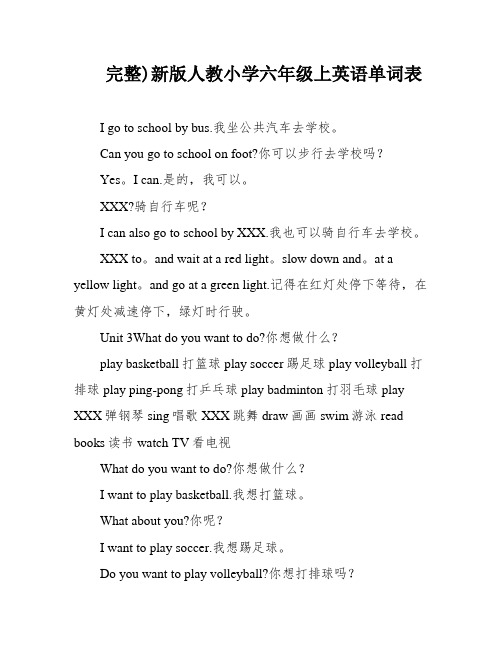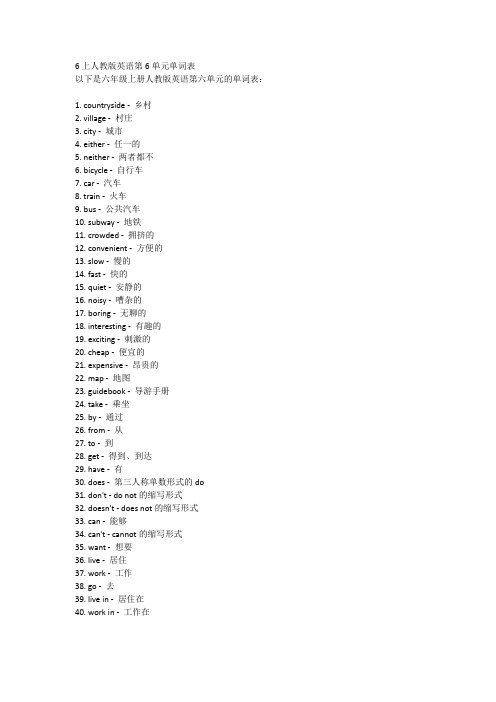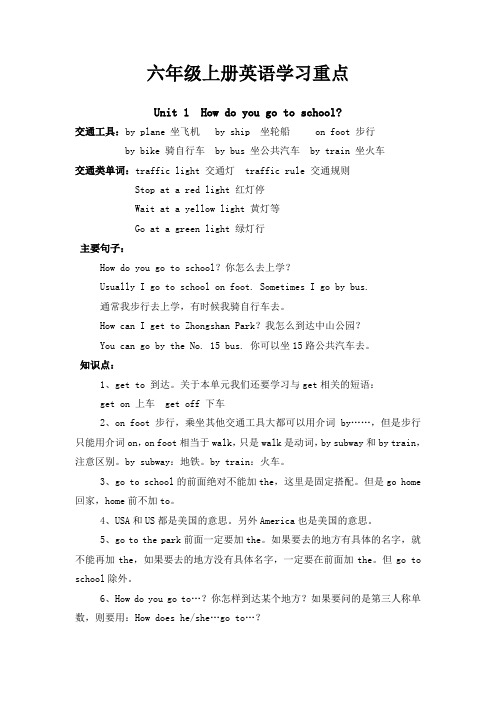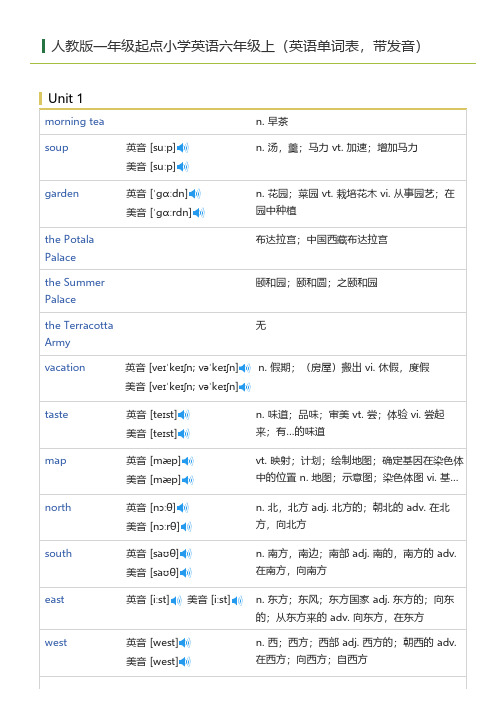6上英语
六年级上英语重点(带英文版)

六年级上英语小单(第一单元)一.单词部分:早餐breakfast 午餐lunch 晚餐supper/dinner 走,步行walk 每一个every 上午morning/am 中午noon 下午afternoon/pm 晚上evening 经常often 容易的easy 困难的difficult 打扫,使…干净clean 窗户window 门door 地板floor 获得,收到get 烹饪,做饭cook 教teach开始begin/start 寄send 主题subject 初级的primary日常的daily 生活life 在…之后after 分钟minute 告诉tell 愿望wish 听listen 说speak 读read 写write 学习learn/study 代替instead 明天tomorrow 总是always 练习practice 一直,仍然still 完美的perfect 在里面inside 相当quite 食物food 蔬菜vegetable 猪肉pork 自己的own 在外面outside 爆米花popcorn 说唱chant二.词组部分:日常生活daily life 起床get up 在早晨in the morning 回家go home 在下午in the afternoon 在晚上in the evening 在中午at noon 吃早餐have breakfast 吃午餐have lunch吃晚餐have dinner/have supper 去上学go to school 看电视watch TV 做家务do the housework 睡觉go to bed 做早餐cook breakfast 散步take a walk 教英语teach English 读故事read stories 通过电子邮件by email 在周六on Saturdays 在周日on Sundays 看电影see a film 上钢琴课have piano lessons 弹钢琴play the piano 在家at home 擦窗户clean the window 擦门clean the door 擦地clean the floor 在八点at 8:00 在晚上七点at 7:00 in the evening 晚餐后after dinner 三十分钟30 minutes 大约在九点半at about 9:30收到你的电子邮件get your email 每天早晨every morning日日夜夜day and night 向…学习learn from三.句子部分:1.我在第六小学。
完整)新版人教小学六年级上英语单词表

完整)新版人教小学六年级上英语单词表I go to school by bus.我坐公共汽车去学校。
Can you go to school on foot?你可以步行去学校吗?Yes。
I can.是的,我可以。
XXX?骑自行车呢?I can also go to school by XXX.我也可以骑自行车去学校。
XXX to。
and wait at a red light。
slow down and。
at a yellow light。
and go at a green light.记得在红灯处停下等待,在黄灯处减速停下,绿灯时行驶。
Unit 3What do you want to do?你想做什么?play basketball打篮球play soccer踢足球play volleyball打排球play ping-pong打乒乓球play badminton打羽毛球play XXX弹钢琴sing唱歌XXX跳舞draw画画swim游泳read books读书watch TV看电视What do you want to do?你想做什么?I want to play basketball.我想打篮球。
What about you?你呢?I want to play soccer.我想踢足球。
Do you want to play volleyball?你想打排球吗?No。
I don’t.不,我不想。
What else do you want to do?你还想做什么?I want to play ping-pong and badminton.我想打乒乓球和羽毛球。
Remember。
we can also play musical instruments。
sing。
dance。
draw。
swim。
read books。
and watch TV.记住,我们还可以弹乐器、唱歌、跳舞、画画、游泳、读书和看电视。
六上人教版英语第六单元单词表

6上人教版英语第6单元单词表以下是六年级上册人教版英语第六单元的单词表:1. countryside -乡村2. village -村庄3. city -城市4. either -任一的5. neither -两者都不6. bicycle -自行车7. car -汽车8. train -火车9. bus -公共汽车10. subway -地铁11. crowded -拥挤的12. convenient -方便的13. slow -慢的14. fast -快的15. quiet -安静的16. noisy -嘈杂的17. boring -无聊的18. interesting -有趣的19. exciting -刺激的20. cheap -便宜的21. expensive -昂贵的22. map -地图23. guidebook -导游手册24. take -乘坐25. by -通过26. from -从27. to -到28. get -得到、到达29. have -有30. does -第三人称单数形式的do31. don't - do not的缩写形式32. doesn't - does not的缩写形式33. can -能够34. can't - cannot的缩写形式35. want -想要36. live -居住37. work -工作38. go -去39. live in -居住在40. work in -工作在希望对你有帮助!。
小学六年级(上下册)英语单词表-人教版

PEP 六年级上册四会单词词汇表Unit 1 by by ((经,乘) foot(脚) bike(自行车) bus(公共汽车) train(火车) how(怎样) go to school (上学)(上学) traffic (交通)(交通)traffic light (交通灯)(交通灯)(交通灯) traffic rule (交通规则)(交通规则) stop (停,停车站)wait (等待)(等待) get to (到达)(到达)Unit 2 library(图书馆) post post office(office(邮局) hospital(医院) ) cinema(cinema(电影院) turn(转弯) bookstore(书店) where(在哪里,到哪里) please(请) next to(与…相邻与…相邻) right (右边右边) left(左边) straight(成直线地) then (然后) Unit 3 next week(下周) this morning(今天上午) this afternoon(今天下午) this this evening evening evening ((今天晚上) comic comic book(book(漫画书) post post card(card(明信片) newspaper(报纸) buy(购买) Unit 4 hobby(爱好) ride a bike--riding a bike(骑自行车) dive--diving(跳水) play the violin —playing the violin(拉小提琴) make kites —making kites(制作风筝) collect stamps —collecting stamps(集邮) live –lives(居住) teach--teaches(教) go--goes(去) watch--watches(看) read--reads(读,看) does doesn ’t=does not Unit 5 singer(歌唱家,歌手) writer(作家) actor(男演员) actress(女演员) artist(画家) TV reporter(电视台记者) engineer(工程师) accountant(会计) policeman(男警察) salesperson(销售员) cleaner(清洁工) where (在哪里,到哪里)(在哪里,到哪里) work (工作)(工作) Unit 6 rain(雨) cloud (云) sun(太阳) stream(河,溪) come from(来自,来自,从…来) seed(种子) soil(土壤) sprout (苗,苗,芽) plant(植物,种植) should (应该应该) then(然后) PEP 六年级下册四会单词词汇表Unit 1 tall —taller 更高的更高的 short —shorter 更矮的更矮的 strong —stronger 更强壮的更强壮的 old —older 年龄更大的年龄更大的 young —younger 更年轻的更年轻的 big —bigger 更大的更大的 heavy —heavier 更重的更重的 long —longer 更长的更长的 thin —thinner 更瘦的更瘦的 small —smaller (体型)更小的(体型)更小的 Unit 2 have a fever 发烧发烧发烧 have a sore throat 喉咙疼喉咙疼 have a cold 感冒感冒 have a toothache 牙疼牙疼牙疼 have a headache 头疼头疼头疼 matter 事情,麻烦事情,麻烦 sore 疼的疼的 hurt 疼痛疼痛 nose 鼻子鼻子 tired 疲劳的,累的疲劳的,累的 excited 兴奋的兴奋的 angry 生气的生气的 happy 高兴的高兴的 bored 无聊的,烦人的无聊的,烦人的 sad 忧伤的,悲伤的忧伤的,悲伤的Unit 3 watch —watched 看 wash —washed 洗 clean —cleaned 打扫打扫 play —played 玩 visit —visited 看望看望 do —did last weekend 上一个周末上一个周末 go —went 去go to a park —went to a park 去公园去公园go swimming —went swimming 去游泳去游泳go fishing —went fishing 去钓鱼去钓鱼 read —read 读 go hiking —went hiking 去远足去远足 Unit 4 learn Chinese —learned Chinese 学汉语学汉语sing and dance —sang and danced 唱歌和跳舞唱歌和跳舞唱歌和跳舞 eat good food —ate good food 吃好吃的食物吃好吃的食物take take pictures pictures —took took pictures pictures 照相照相 climb —climbed 爬 have —had buy presents —bought presents 买礼物买礼物 row a boat—rowed a boat 划船 see see elephant elephant —saw saw elephant elephant 看大象看大象 go go skiingskiing —went went skiing skiing 去滑雪 go go ice-skating ice-skating —went went ice-skating ice-skating 去滑冰去滑冰 how 怎么,如何怎么,如何 get —got 到达到达 last 上一个的,仅余的,留在最后的上一个的,仅余的,留在最后的。
六年级英语上册单元重点句子

六年级英语上册单元重点句子六上Unit 1 1. A: Where is the museum shop? 博物馆的商店在哪儿?博物馆的商店在哪儿?B: It’s near the door. 在大门附近。
在大门附近。
2. A: How can we get there? 我们怎么到那儿?我们怎么到那儿?B: Turn left at the bookstore. 在书店左转。
在书店左转。
3. I want to buy a postcard. 我想买一张明信片。
我想买一张明信片。
4. What a great museum! 真是个伟大的博物馆!真是个伟大的博物馆!5. What an interesting film! 真是一部有趣的电影!真是一部有趣的电影!6. Wu Yifan’s grandpa gave Robin a new feature. 一个新特性。
吴一凡的爷爷给Robin一个新特性。
7. He now has a GPS. 了。
现在他有GPS了。
8. He can help the boys find the Italian restaurant. 他能帮助男孩们找到意大利餐厅。
他能帮助男孩们找到意大利餐厅。
9. Let’s eat first. I’m so hungry. 我们先吃。
我很饿。
我们先吃。
我很饿。
六上Unit 2 1. A: How do you come to school? 你怎么来学校的?你怎么来学校的?B: Usually, I come on foot. 通常我走路来。
通常我走路来。
C: Sometimes, I walk to school. 有时候,我步行去学校。
有时候,我步行去学校。
2. In the USA people on bikes must wear a helmet. 在美国骑自行车的人必须戴头盔。
在美国骑自行车的人必须戴头盔。
3. Don’t go at the red light! 别闯红灯。
六年级上英语学习重点

六年级上册英语学习重点Unit 1 How do you go to school?交通工具:by plane 坐飞机 by ship 坐轮船 on foot 步行by bike 骑自行车 by bus 坐公共汽车 by train 坐火车交通类单词:traffic light 交通灯 traffic rule 交通规则Stop at a red light 红灯停Wait at a yellow light 黄灯等Go at a green light 绿灯行主要句子:How do you go to school?你怎么去上学?Usually I go to school on foot. Sometimes I go by bus.通常我步行去上学,有时候我骑自行车去。
How can I get to Zhongshan Park?我怎么到达中山公园?You can go by the No. 15 bus. 你可以坐15路公共汽车去。
知识点:1、get to 到达。
关于本单元我们还要学习与get相关的短语:get on 上车 get off 下车2、on foot 步行,乘坐其他交通工具大都可以用介词by……,但是步行只能用介词on,on foot相当于walk,只是walk是动词,by subway和by train,注意区别。
by subway:地铁。
by train:火车。
3、go to school的前面绝对不能加the,这里是固定搭配。
但是go home 回家,home前不加to。
4、USA和US都是美国的意思。
另外America也是美国的意思。
5、go to the park前面一定要加the。
如果要去的地方有具体的名字,就不能再加the,如果要去的地方没有具体名字,一定要在前面加the。
但go to school除外。
6、How do you go to…?你怎样到达某个地方?如果要问的是第三人称单数,则要用:How does he/she…go to…?7、反义词:get on(上车)—get off(下车) near(近的)—far(远的) fast(快的)—slow(慢的) same(相同的)—different(不同的)。
英语六年级上册期末知识点总结

英语六年级上册期末知识点总结英语六年级上册期末知识1一、单词line(等候的)长队,队列stand in line排队close关门,关闭librarian图书馆管理员rule规定,规章quiet安静的problem麻烦,困难,问题No problem没问题cross穿过(马路等);渡过(河)二、短语:1.帮助我 Help me2. Don’t walk! 不要走3. in line 成一条直线4. be quiet 安静!5. go to the library 去图书馆6. at the library在图书馆(强调地点)7. Here`s the book.这本书在这儿、8. ten to five 4点五十9. the library rules 图书馆规定10. library card 借书卡11. turn right 向右转向左转 turn left12. Please hurry 请快点13. go straight on 直走14. be difficult是难的15. be easy 是容易的16. Don`t go !禁止前行/不要走!17. Don`t walk!禁止步行!18. It`s green now.现在是绿灯了。
19. Don`t ride your bicycle here!此处禁止骑自行车!20. Don`t turn right here!此处禁止右转!21. Please hurry.请快点/请抓紧。
22. Don`t walk on the grass!禁止踩踏草坪!23. clap your hands拍手24. stamp your feet跺脚25. want to show it.想展示出来26. You`re out!你出局了!27 It says, “Don’t talk in the library”不要在图书馆里交谈Don’t= do not三、句型:1.Where are you going,Simon?To the library.Please hurry.It`s ten to five.西蒙,你要去哪里?去图书馆。
人教版一年级起点小学英语六年级上(英语单词表)

人教版一年级起点小学英语六年级上(英语单词表,带发音)Unit 1morning tea n. 早茶soup英音 [suːp]美音 [suːp]n. 汤,羹;马力 vt. 加速;增加马力garden英音 [ˈɡɑːdn]美音 [ˈɡɑːrdn]n. 花园;菜园 vt. 栽培花木 vi. 从事园艺;在园中种植the PotalaPalace布达拉宫;中国西藏布达拉宫the SummerPalace颐和园;颐和圆;之颐和园the TerracottaArmy无vacation英音 [veɪˈkeɪʃn; vəˈkeɪʃn]美音 [veɪˈkeɪʃn; vəˈkeɪʃn]n. 假期;(房屋)搬出 vi. 休假,度假taste英音 [teɪst]美音 [teɪst]n. 味道;品味;审美 vt. 尝;体验 vi. 尝起来;有…的味道map 英音 [mæp]美音 [mæp]vt. 映射;计划;绘制地图;确定基因在染色体中的位置 n. 地图;示意图;染色体图 vi. 基…north英音 [nɔːθ]美音 [nɔːrθ]n. 北,北方 adj. 北方的;朝北的 adv. 在北方,向北方south英音 [saʊθ]美音 [saʊθ]n. 南方,南边;南部 adj. 南的,南方的 adv.在南方,向南方east英音 [iːst]美音 [iːst]n. 东方;东风;东方国家 adj. 东方的;向东的;从东方来的 adv. 向东方,在东方west 英音 [west]美音 [west]n. 西;西方;西部 adj. 西方的;朝西的 adv.在西方;向西方;自西方Unit 2famous 英音 [ˈfe ɪm əs]美音 [ˈfe ɪm əs]adj. 著名的;极好的,非常令人满意的temple 英音 [ˈtemp(ə)l]美音 [ˈtempl]n. 庙宇;寺院;神殿;太阳穴around 英音 [əˈra ʊnd]美音 [əˈra ʊnd]prep. 四处;在…周围 adv. 大约;到处;在附近the Yangtze River na. 长江foggy英音 [ˈf ɒɡi]美音 [ˈfɑːɡi]adj. 有雾的;模糊的,朦胧的spicy英音 [ˈspa ɪsi]美音 [ˈspa ɪsi]adj. 辛辣的;香的,多香料的;下流的silk英音 [s ɪlk]美音 [s ɪlk]n. 丝绸;蚕丝;丝织物 adj. 丝的;丝绸的;丝制的 vi. (玉米)处于长须的阶段中forest 英音 [ˈf ɒr ɪst]美音 [ˈf ɔːr ɪst]n. 森林 vt. 植树于,使成为森林stone 英音 [st əʊn]美音 [sto ʊn]n. 石头;结石;[宝] 宝石 adj. 石的,石制的vt. 向扔石块;用石头铺London英音 [ˈl ʌnd ən]美音 [ˈl ʌnd ən]n. 伦敦Toronto英音 [t əˈr ɒnt əʊ]美音 [t əˈrɑːnto ʊ]n. 多伦多(加拿大城市)Sydney英音 [ˈs ɪdni]美音 [ˈs ɪdni]n. 悉尼(澳大利亚港市)Washington D.C.华盛顿;华盛顿哥伦比亚特区;华盛顿特区the British大英博物馆;伦敦大英博物馆;不列颠博物馆Unit 5Museum the CN Tower 无kangaroo英音 [ˌkæŋɡəˈru ː]美音 [ˌkæŋɡəˈru ː]n. 袋鼠the Opera House 悉尼歌剧院;剧院及电影院;大剧院the White House na. 白宫clock英音 [kl ɒk]美音 [klɑːk]n. 时钟;计时器 vt. 记录;记时 vi. 打卡;记录时间speak英音 [spi ːk]美音 [spi ːk]vi. 说话;演讲;表明;陈述 vt. 讲话;发言;讲演Tower Bridge n. 【旅】塔桥;【旅】伦敦塔桥the London Eye 伦敦眼;英航伦敦眼;英国伦敦眼hiking英音 [ˈha ɪk ɪŋ]美音 [ˈha ɪk ɪŋ]n. 徒步旅行sunrise英音 [ˈs ʌnra ɪz]美音 [ˈs ʌnra ɪz]n. 日出;黎明president英音 [ˈprez ɪd ənt]美音 [ˈprez ɪd ənt]n. 总统;董事长;校长;主席French英音 [frent ʃ]美音 [frent ʃ]n. 法国人;法语 adj. 法国的;法语的;法国人的inventor英音 [ɪn ˈvent ə(r)]美音 [ɪn ˈvent ər]n. 发明家;[专利] 发明人;创造者artist英音 [ˈɑːt ɪst]美音 [ˈɑːrt ɪst]n. 艺术家;美术家(尤指画家);大师scientist英音 [ˈsa ɪənt ɪst]n. 科学家美音 [ˈsaɪəntɪst]poet英音 [ˈpəʊɪt]美音 [ˈpoʊət]n. 诗人writer英音 [ˈraɪtə(r)]美音 [ˈraɪtər]n. 作家;作者American英音 [əˈmerɪkən]美音 [əˈmerɪkən]n. 美国人,美洲人;美国英语 adj. 美国的,美洲的;地道美国式的French英音 [frentʃ]美音 [frentʃ]n. 法国人;法语 adj. 法国的;法语的;法国人的Danish英音 [ˈdeɪnɪʃ]美音 [ˈdeɪnɪʃ]n. 丹麦语 adj. 丹麦的;丹麦人的;丹麦语(文)的poem英音 [ˈpəʊɪm]美音 [ˈpoʊəm]n. 诗paint英音 [peɪnt]美音 [peɪnt]vt. 油漆;绘画;装饰;涂色于;描绘;(用语言,文字等)描写;擦脂粉等 vi. 油漆;描…invention英音 [ɪnˈvenʃn]美音 [ɪnˈvenʃn]n. 发明;发明物;虚构;发明才能invent英音 [ɪnˈvent]美音 [ɪnˈvent]vt. 发明;创造;虚构study英音 [ˈstʌdi]美音 [ˈstʌdi]n. 学习,研究;课题;书房;学问 vt. 学习;考虑;攻读;细察 vi. 研究;用功story英音 [ˈstɔːri]美音 [ˈstɔːri]n. 故事;小说;新闻报道;来历;假话 vt. 用历史故事画装饰 vi. 说谎university英音 [ˌjuːnɪˈvɜːsəti]美音 [ˌjuːnɪˈvɜːrsəti]n. 大学;综合性大学;大学校舍deaf 英音 [def]美音 [def]adj. 聋的blind英音 [blaɪnd]美音 [blaɪnd]n. 掩饰,借口;百叶窗 adj. 盲目的;瞎的 vt.使失明;使失去理智 adv. 盲目地;看不见地Unit 3fall 英音 [f ɔːl]美音 [f ɔːl]n. 下降;秋天;瀑布 adj. 秋天的 vi. 落下;变成;来临;减弱vt 砍倒;击倒reptile英音 [ˈrepta ɪl]美音 [ˈrepta ɪl; ˈreptl]n. 爬行动物;卑鄙的人 adj. 爬虫类的;卑鄙的bird英音 [b ɜːd]美音 [b ɜːrd]n. 鸟;家伙;羽毛球 vt. 向…喝倒彩;起哄 vi.猎鸟;观察研究野鸟fish英音 [f ɪʃ]美音 [f ɪʃ]n. 鱼,鱼类 vt. 钓鱼,捕鱼;搜寻 vi. 捕鱼,钓鱼;用钩捞取mammal英音 [ˈmæm(ə)l]美音 [ˈmæml]n. [脊椎] 哺乳动物insect英音 [ˈɪnsekt]美音 [ˈɪnsekt]n. 昆虫;卑鄙的人penguin英音 [ˈpeŋɡw ɪn]美音 [ˈpeŋɡw ɪn]n. 企鹅;空军地勤人员shark英音 [ʃɑːk]美音 [ʃɑːrk]n. 鲨鱼;骗子 vt. 敲诈 vi. 诈骗whale英音 [we ɪl]美音 [we ɪl]n. 鲸;巨大的东西 vt. 猛揍;使惨败 vi. 捕鲸kind英音 [ka ɪnd]美音 [ka ɪnd]n. 种类;性质 adj. 和蔼的;宽容的;令人感激的metre英音 [ˈmi ːt ə(r)]美音 [ˈmi ːt ər]n. 米;公尺;韵律spend英音 [spend]美音 [spend]n. 预算 vt. 度过,消磨(时光);花费;浪费;用尽 vi. 花钱;用尽,耗尽trunk英音 [tr ʌŋk]美音 [tr ʌŋk]n. 树干;躯干;象鼻;汽车车尾的行李箱 adj.干线的;躯干的;箱子的 vt. 把…放入旅行箱…peanut英音 [ˈpi ːn ʌt]n. 花生Unit 6tusk英音 [t ʌsk]美音 [t ʌsk]n. 长牙;尖头,尖形物 vt. 以牙刺戳;以长牙掘Africa英音 [ˈæfr ɪk ə]美音 [ˈæfr ɪk ə]n. 非洲Asia英音 [ˈe ɪʒə]美音 [ˈe ɪʒə]n. 亚洲smart英音 [smɑːt]美音 [smɑːrt]adj. 聪明的;巧妙的;敏捷的;厉害的;潇洒的;剧烈的;时髦的fan英音 [fæn]美音 [fæn]n. 迷;风扇;爱好者 vt. 煽动;刺激;吹拂 vi.成扇形散开;飘动dumpling英音 [ˈd ʌmpl ɪŋ]美音 [ˈd ʌmpl ɪŋ]n. 饺子,汤团;面团布丁fan英音 [fæn]美音 [fæn]n. 迷;风扇;爱好者 vt. 煽动;刺激;吹拂 vi.成扇形散开;飘动ice lantern 无bring英音 [br ɪŋ]美音 [br ɪŋ]vt. 带来;促使;引起;使某人处于某种情况或境地be afraid of na. 怕hear英音 [h ɪə(r)]美音 [h ɪr]vi. 听;听见 vt. 听到,听;听说;审理pen pal英音 [ˈpen pæl]美音 [ˈpen pæl]abbr. (=pen-friend) n. 笔友broken英音 [ˈbr əʊk ən]美音 [ˈbro ʊk ən]v. 折断;打碎;损坏(break的过去分词)adj. 破碎的;坏掉的pity英音 [ˈp ɪti]n. 怜悯,同情;遗憾 vt. 对……表示怜悯;对……感到同情Unit 4prize英音 [pra ɪz]美音 [pra ɪz]n. 奖品;奖赏;战利品 adj. 获奖的 vt. 珍视;捕获;估价look forward tona. 盼望scared英音 [ske əd]美音 [skerd]v. 使害怕(scare的过去分词) adj. 害怕的worried英音 [ˈw ʌrid]美音 [ˈw ɜːrid]adj. 担心的angry英音 [ˈæŋɡri]美音 [ˈæŋɡri]adj. 生气的;愤怒的;狂暴的;(伤口等)发炎的proud英音 [pra ʊd]美音 [pra ʊd]adj. 自豪的;得意的;自负的sad英音 [sæd]美音 [sæd]adj. 难过的;悲哀的,令人悲痛的;凄惨的,阴郁的(形容颜色)excited英音 [ɪk ˈsa ɪt ɪd]美音 [ɪk ˈsa ɪt ɪd]v. 激动;唤起(excite的过去分词) adj. 兴奋的;激动的;活跃的happy英音 [ˈhæpi]美音 [ˈhæpi]adj. 幸福的;高兴的;巧妙的ill英音 [ɪl]美音 [ɪl]n. 疾病;不幸 adj. 生病的;坏的;邪恶的;不吉利的 adv. 不利地;恶劣地;几乎不win英音 [w ɪn]美音 [w ɪn]n. 赢;胜利 vt. 赢得;在…中获胜;劝诱 vi.赢;获胜;成功race英音 [re ɪs]美音 [re ɪs]n. 属,种;种族,人种;家庭,门第 vt. 使参加比赛;和…竞赛;使急走,使全速行进 vi. …find英音 [fa ɪnd]美音 [fa ɪnd]n. 发现 vi. 裁决 vt. 查找,找到;发现;认为;感到;获得cry英音 [kra ɪ]美音 [kra ɪ]n. 叫喊;叫声;口号;呼叫 vi. 哭;叫;喊 vt.叫喊;哭出;大声说because英音 [bɪˈkəz]美音 [bɪˈkəz]conj. 因为test 英音 [test]美音 [test]n. 试验;检验 vt. 试验;测试 vi. 试验;测试competition英音 [ˌkɒmpəˈtɪʃn]美音 [ˌkɑːmpəˈtɪʃn]n. 竞争;比赛,竞赛hurt英音 [hɜːt]美音 [hɜːrt]n. 痛苦;危害;痛苦的原因 vt. 使受伤;损害;使疼痛;使痛心 adj. 受伤的;痛苦的;…。
- 1、下载文档前请自行甄别文档内容的完整性,平台不提供额外的编辑、内容补充、找答案等附加服务。
- 2、"仅部分预览"的文档,不可在线预览部分如存在完整性等问题,可反馈申请退款(可完整预览的文档不适用该条件!)。
- 3、如文档侵犯您的权益,请联系客服反馈,我们会尽快为您处理(人工客服工作时间:9:00-18:30)。
教学内容:Checkout tim e﹠Ticking time
教学目标:
1.正确完成书上Checkout中的练习。
2.熟练并正确地比较过去和现在。
3.复习并巩固前三课时所学的单词和句型。
4.正确使用过去与现在的句型写短文:I’ve grown up!
教学重点难点:
1.复习并巩固前三课时所学的单词与句型。
2.正确使用过去与现在的句型写短文:I’ve grown up!
教学准备:PPT,照片,卡纸
教学过程:
1.Hello,boys and girls, welcome back again. Nice to see you . Today
let’s go on learning this unit. What is the topic?
2.At this lesson,we’ll have a main task. Look, the task is: Write a
passage I’ve growing up! At the end of this lesson, please try to finish the passage. OK?
3.Firstly, let’s play a game, it’s called: Choose and classify. For me ,
some words that used in the past and some of them that used in the present . Can you classify them?
See, I play with iPad now , but I didn’t play with it the past . So I put
iPad here.
And I used films to take photos in the past, but now I don’t use them.
So I put films here.
And I drank tea in the past, now I still drink tea, so we should put here. Do you know how to classify the word now?
Now discuss with your partner and then classify all the words here.
When you classify the words , don’t forget to use the sentences here.
You can say like this: In the past, you…Now, you…
Let’s check together.
4.Just now, you could classify the words that used in the past and the
present. Which one do you prefer? That means which one do you like better ,life in the past or life today?
You can answer the question in this way: I think life in the past was …Life today is…
T: I like the life today, because it’s very convenient. What do you think?
5.Someone likes the life today, but someone doesn’t . No matter
whether we like it or not, we will grow up! Look, this is Mike’s family photo. But what were they like when they were young? What could they do? What couldn’t they do? Let’s take a look.
6.Look at their photos, can you say something about them according to
the photos? Please try to guess from the photos.
T: Look at this baby. Who’s he?
S: He’s Tim.
T: Can you say something about him?
S: Tim wan one year old. He couldn’t …
T: What else…?
S:…
T: She’s Helen’s mother.
Could you say something about Mrs Brown?
S: She was …She could cook.
7.Now let’s know more about the members in Mike’s family. Open
your books , read this part and finish the exercise here.
Let’s check together.
Boys and girls, you should use could and couldn’t correctly.
8.You know Mike’s family. What about you? Now it’s time for us to
write a passage : I’ve grown up!
(1)板书:I’ve grown up!
(2)What aspects can we compare?
I’ve grown up!
Hobbies Appearance Abilities learning
(帮助学生翻译)
(3)What sentences can we write?
I’ve grown up!
Hobbies : I liked…
I don’t like…
I like…
Appearance : I was…
My hair was…
Now I am
My…is/are…
Abilities : I could…
I couldn’t …
Now I can…
Learning: I learned …
I didn’t learn…
I was (am) good at….
9. I think you know how to write this passage well. Now please try to write a passage, you see, in your books , you can write it in your book, and you can also write more. But remember , when you compare the
past with the present, you should use the tense correctly.
10. What do you think of his passage? Which sentence do you like best?
11. I think you can finish the task at this lesson. And you know ,in this unit, we have learned a lot. Do you still remember the contents that we have learned? I’ll give you some time to think it over.
Let’s come to Ticking time. Who can read them?
S:…
T: Now please do ticking time in groups. If you can do them well, you can get three stars or two stars. If you still have some problems, you only get one star and should work harder on it.
T: How many stars can you get? Now check in groups.
T: 全班逐条反馈并监测。
12. Homework:
1)Review all the contests in Unit4.
2) Finish the passage.
3) Read a passage “Food shopping”.
板书:I’ve grown up!
Hobbies : I liked…
I don’t like…
I like…
Appearance : I was…
My hair was…
Now I am
My…is/are…Abilities : I could…
I couldn’t …
Now I can…Learning: I learned …
I didn’t learn…
I was (am) good at….。
